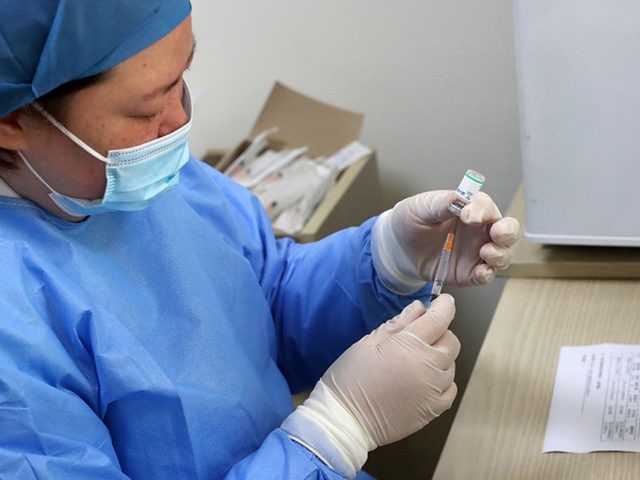China’s state-run Global Times on Tuesday quoted a “new study,” which has not yet been peer-reviewed, that suggested a third dose of China’s ineffective Sinovac vaccine candidate could produce a “remarkable increase in antibody levels” and a “strong boost in immune response,” bringing Sinovac closer to the quality of competing products such as AstraZeneca’s vaccine.
Widespread use of China’s vaccines has been accompanied by surges in coronavirus infections difficult for the Chinese government to explain. Sinovac’s “Coronavac” and China’s other major vaccine candidate, from the firm Sinopharm, use the older inactive-virus vaccine technology – in essence, injecting dead virus cells into the human body to create a desirable immune response – while AstraZeneca and the other major Western vaccines use mRNA technology.
Testing at 50.38 percent efficacy at preventing symptomatic coronavirus infections, “Coronavac” barely passes the 50-percent threshold to be considered usable and is considered the least effective vaccine candidate currently in worldwide distribution that has published efficacy data.
China grudgingly and belatedly acknowledged its vaccines are not as effective as the competition (and then retracted the concession) but the real-world experience of countries reliant on Chinese vaccines has been even less encouraging than Beijing’s revised claims. Sinovac client Thailand announced two weeks ago that it will begin administering AstraZeneca “booster shots” to medical workers who already received both doses of Sinovac.
The Chinese state outlet Global Times on Tuesday claimed a new unreviewed study with 540 participants found that Sinovac’s antibody levels decline after six months, but a third dose administered six to eight months after the second supposedly corrects the problem.
“The study also found that giving a third dose too early (28 days after the second dose) induced a much lower antibody level – only one third compared with a third dose given six or more months after a second dose,” the Global Times wrote.
“None of the serious adverse events observed during the study were considered to be related to the vaccination,” the report added, without getting into the details of those “serious adverse events.”
The Global Times did, however, make room for Sinovac’s latest safety study, which claimed an average of only 87.5 adverse events per one million doses, including some “very rare cases of anaphylaxis.” Seven “serious” adverse reactions were deemed to have “no causal relationship with Covid-19 [Chinese coronavirus] vaccination” by the Sinovac study.
Reuters noted on Tuesday that several countries which purchased Sinovac from China have already begun offering third-dose booster shots. As with Thailand, sometimes the booster shot is from a different vaccine manufacturer, such as AstraZeneca or Moderna.

COMMENTS
Please let us know if you're having issues with commenting.